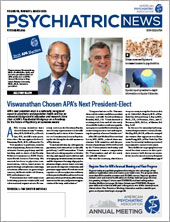The psychiatry residents who are completing their residency this year face a number of colliding challenges: They are beginning their careers at a time of an unprecedented demand for mental health services in the wake of the global pandemic and a severe psychiatric workforce shortage. They also have what seems to be an endless number of career paths.
Last December, the Area 4 Council of the APA Assembly hosted a virtual presentation titled “Residency Is Over, So What Now?” Residents and fellows throughout the nation listened to a panel of young physicians representing diverse practice types and an experienced attorney and financial planner who shared their wisdom and experience.
The program began with a discussion of important financial matters including tax liability, retirement planning, and tools to finance personal priorities. Two key takeaways were to plan early for retirement and plan for emergencies. Our guest financial advisor recommended a familiar salary allocation known as the 50/30/20 rule: 50% is earmarked for necessities and obligations; 30% for discretionary purchases; and 20% for retirement planning, debt repayment, and savings.
After a discussion of how to protect one’s hard-earned income, the discussion turned to recognizing the limits of one’s legal knowledge—it is imperative to seek professional advice prior to signing employment contracts and taking out personal, home, and practice loans; and to build an advisory team consisting of an attorney, accountant, tax advisor, banker, insurance agent, and consulting specialists such as an information technologist. A team of professional advisors will offer protection while new physicians focus on building a practice, interacting with patients, understanding legal obligations, and protecting assets.
After discussing these fundamentals, a panel of early career physicians shared their practice and planning experiences, along with their successes and failures. Although their career pathways were different, the panelists agreed that networking and mentoring are important. Valuable takeaways included Dr. Kyle LeMasters’ advice to “know your value,” while Dr. Erica Steinbrenner advised residents to “create exactly the practice you want.” Dr. Matt Kruse urged participants to take a personal inventory of their interests and goals before accepting a position. Dr. Erika Larson echoed this advice when she counseled participants to build a practice that reflects their goals and needs. For example, those who enjoy traveling and new challenges might find that a locum tenens position is a good fit, but for structure and predictability, a government practice or employed position may be optimal.
Many new physicians find that their first position is not an optimal fit. In fact, 47% of physicians change positions in the first five years of practice. The early career panelists agreed that practice preferences may change as priorities and life circumstances evolve, so it is important that newly practicing physicians give themselves the grace to explore or create new professional opportunities and maintain that openness throughout their professional life. In summary, as Dr. John Korpics advised, “Define your own future.” ■

